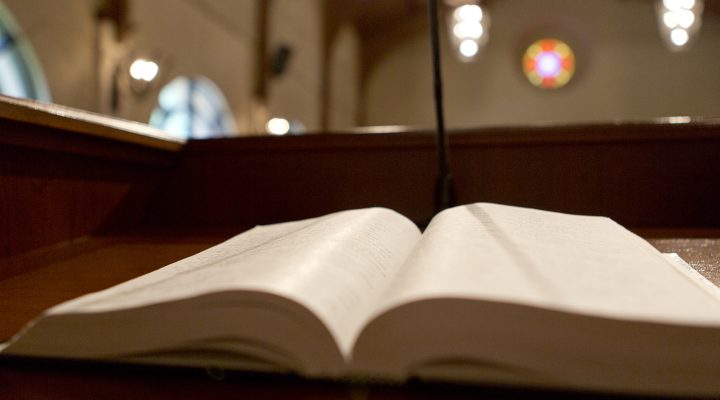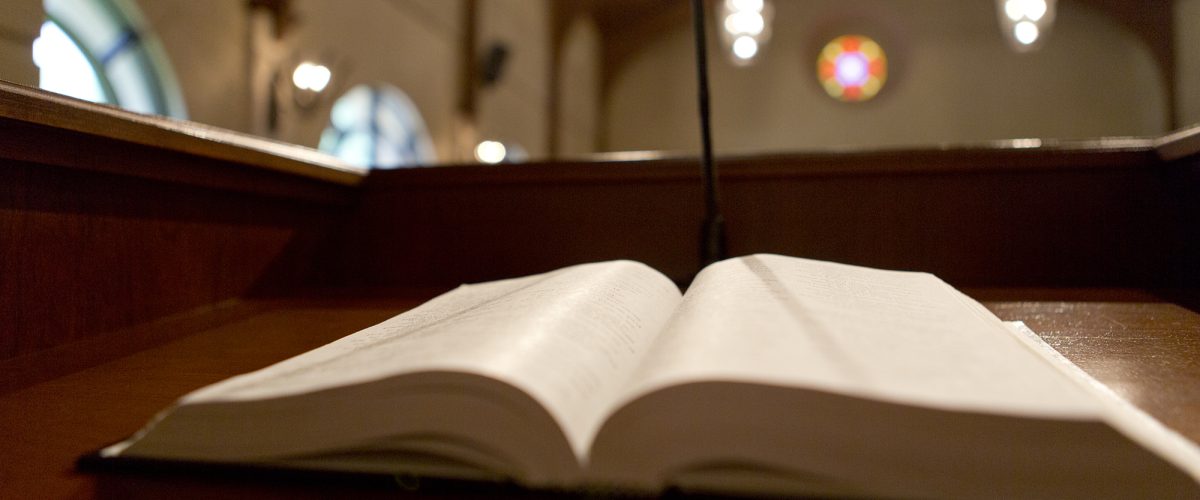While conservative evangelical and Catholic churches across America celebrated Friday’s Supreme Court ruling rescinding a federal right to abortion care, sermons and prayers in other congregations ranged from lament to outrage to calls for simply getting along with each other.
Sunday, June 26, turned out to be one of those rare occasions when the connection between faith and politics could not be avoided.
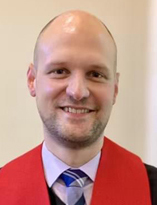
Tim Schaefer
“I am put in a position to address things that concern the people, the congregation, and sometimes those issues are difficult to address. They’re not easy, especially when we may not all agree. But I think it’s important that we not shy away from difficult conversations, that we are honest with one another and we have dialogue,” Tim Schaefer, pastor of First Baptist Church of Madison, Wisc., said in comments before the pastoral prayer. “I know some of you may be lamenting, some of you may be celebrating the Supreme Court decision this week.”
However, “our Baptist faith is rooted very deeply in a couple of traditions, the first being the separation of church and state,” he added. “We believe no single religious belief or interpretation of Scripture should be used by the government to dictate practices on everybody else. … I think this ruling, which is not based in science, which is based on a single interpretation of Scriptures, should trouble us all.”
Baptists also believe in freedom, Schaefer said, “including the freedom of everybody to define their relationship with their Maker, their Creator, and for each of us to interpret Scripture. We don’t all agree, but I think we can all support the right of women and not just cisgender women but also those in the transgender or gender-nonconforming community, to make their own decisions based on their own faith — to make those decisions that are best for them. We should trust people to make their own decisions.”
“I consider it to be theological malpractice to use our sacred Scriptures to shame someone or to make them feel guilty for a decision that they make in good faith.”
A call to love
Schaefer added: “I consider it to be theological malpractice to use our sacred Scriptures to shame someone or to make them feel guilty for a decision that they make in good faith. That is not what we are called to do. We are called to love. And so if you have had an abortion or have ever considered an abortion or are considering one or are struggling to figure out how you will get abortion care, know this: I love you, this congregation loves you and most importantly, God loves you.”
That message of love was echoed by Stephen Butler Murray, senior minister at First Congregational Church in Nantucket, Mass.
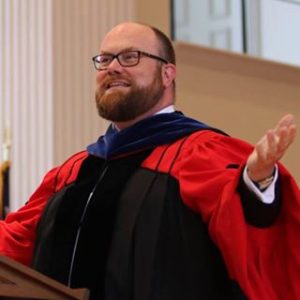
Stephen Butler Murray
“One of the great graces of this particular church is that we come from different backgrounds and beliefs and we are all over the map on matters of politics,” he said. “But let us acknowledge that the Supreme Court’s decision to overturn Roe v. Wade this week is one that is difficult for many to bear. While some here will celebrate this decision, others here will mourn this as an utter violation.
“Both interpretations of this decision are present in our congregation, and the irresponsible response would be not to acknowledge that. But no matter who you are, no matter how you feel, know that you are held in the love of God, in the love of this diverse community of believers and seekers, and that I will be your minister and keep your confidences through whatever you need to talk about with me in the days and weeks and months ahead. No matter where you stand on this issue, you are not alone.”
Connecting with the Lectionary texts
In many moderate to progressive churches this Sunday, prayers and sermons keyed in on similar themes of freedom, the misuse of Scripture for a political agenda and calls to resistance.
Preachers who follow the Lectionary found ample ammunition in the two New Testament passages assigned to this week.
Galatians 5 includes these well-known lines: “For freedom Christ has set us free. Stand firm, therefore, and do not submit again to a yoke of slavery. For you were called to freedom, brothers and sisters; only do not use your freedom as an opportunity for self-indulgence, but through love become slaves to one another. For the whole law is summed up in a single commandment, ‘You shall love your neighbor as yourself.’”
And Luke 9 tells about Jesus, with his “face set toward Jerusalem,” where he faced certain arrest and those who rejected his message, prompting the disciples James and John to ask him, “Lord, do you want us to command fire to come down from heaven and consume them?”
At New Creation and Faith Presbyterian Church in Greensboro, N.C., Pastor Keith Curl-Dove addressed the Luke text: “On Friday morning this week, a different sort of fire came raining down. From people who claim to be disciples of Christ and who we have been entrusted to protect the rights and liberties of all people in this country.
“The Supreme Court’s ruling on Dobbs v. Jackson Women’s Health Organization … rains fire on women and all people who can be pregnant.”
“In the Gospel story today, James and John want to rain down fire to destroy those who believed differently than they did. They wanted to kill everyone in the village. The Supreme Court’s ruling on Dobbs v. Jackson Women’s Health Organization … rains fire on women and all people who can be pregnant.”
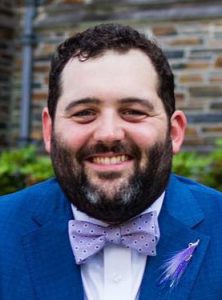
Keith Curl-Dove
The result, he said, is “fear and devastation. I watched the faces of women this week at the conference I attended as everyone got the update on their phones or laptops. And it was absolutely heartbreaking.”
“But the worst thing of all is not just the emotional fire and the fear that millions and millions of people must now live with. It is that this fire will kill. Very plainly, and in simple terms: Women and people with uteruses will die from this decision. This fire will kill. And it will kill the least of these, women of color and poor women, at the highest rates.
“Abortion access and reproductive rights are still in place for those who are wealthy enough to travel to another state and take off work. But for the poor, women will die. This fire will burn like hell.”
Ashley Robinson, interim pastor for Christian education and community engagement at Oakhurst Baptist Church in Decatur, Ga., also picked up the fire theme.
“We’re faced again with a week of news that is too much too muchness — reproductive justice, gone; COVID, still here; gun violence, louder than many of our songs and prayers and not quite there legislation. Today I find myself relating quite closely to the disciples who offered to burn it all down — to call down fire and start over — to rain holy vengeance because apparently our votes and protests are not enough, and our thoughts and prayers hold up about was well as a paper straw. ‘We’ll take care of them,’ I want to say, because demolishing those who are against us is part of our lineage — it’s the American way.”
“I find myself relating quite closely to the disciples who offered to burn it all down — to call down fire and start over — to rain holy vengeance because apparently our votes and protests are not enough, and our thoughts and prayers hold up about was well as a paper straw.”
Despite that inner rage Christians may feel, “we see Jesus here with his face set toward Jerusalem, toward restoration, toward freedom. While my heart doesn’t always grasp that determination, I feel his rebuke when my instinct is to use what little power I have to self-destruct or to cause more pain through vengeance. I hear his rebuke as a call for those of us with power to reject the urge to abuse that power. I feel his rebuke as an invitation to turn my face toward freedom and restoration, even if my heart isn’t there yet.”

Ashley Robinson
And yet injustice abounds, she added. “We have certainly made a bed for a version of Jesus in our churches, our banks and our government. White American Jesus is cuddled up to the lawmakers who want to take our rights and ensure that the way of Jesus is the American way. So, before I walk away, before I take my toys and go home, I have to remember that fair-skinned, rich, evangelical, white supremacist Jesus is not who is speaking to us in this Luke passage today. The hard truth about the vulnerability of Jesus the Christ is almost impossible to imagine when we are faced with distorted Christian nationalist images of Christ every day.
“The truth is that there is no place for the radically welcoming, hogwash-resistant Jesus of the Scripture to lay his head, unless we continue to make room for him in our churches and our communities. There is no place for the pregnant-with-hope Christ Sophia to put her feet up unless we continue to push for legislation that recognizes the full humanity and rights of every single human. There is no place for the brown-skinned Imago Dei to lay his head unless we begin the eviction proceedings for the White Supremacist Jesus to be removed from every house — including the house and the Senate and the Supreme Court, and the White House.
“If we are to be followers of Christ, we have to keep our faces set toward Jerusalem, toward justice, toward liberation so that we can keep traveling until every person who bears the Image of God (and newsflash, that’s all of us) has a place to lay their head,” Robinson concluded.
Last-minute sermon revisions
Several pastors admitted to their congregations that Friday morning’s news from the Supreme Court upended sermons they had completed the day before. That demanded a furious rewrite over the weekend.
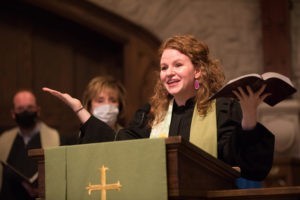
Mary Alice Birdwhistell
At Highland Baptist Church in Louisville, Ky., Pastor Mary Alice Birdwhistell had planned a clever sermon title for the Galatians text, “Raise a Glass to Freedom,” an homage to a song from the hit Broadway musical “Hamilton.”
Almost immediately after closing her laptop Friday morning with a sense of accomplishment, news broke about the Supreme Court ruling. “Just moments later, and as the day continued to unfold, I knew this sermon, and this title, would no longer suffice,” she said.
“I cannot begin to fully and faithfully address the Supreme Court’s decision from Friday only 48 hours later or its many impacts and implications for the different people who are part of our community of faith. I also can’t begin to fully and faithfully address a topic as nuanced and complex as abortion and reproductive health in one single sermon. However, what is especially on my heart this morning is each of you, because I have heard from so many of you this weekend. I see your anxiety. I feel your fear. Your anger. Your pain. And I know that what I am personally experiencing feels to me like an especially raw and fragile space. And this morning, I want to speak to just that.”
“I have heard from so many of you this weekend. I see your anxiety. I feel your fear. Your anger. Your pain.”
As a pastor, she said, she has learned that “God always has a word. It may not always come on our timeline, but like manna in the wilderness, it always comes.”
Faced with the new reality, Birdwhistell went back to the Galatians text and studied it again. There, “I found strength and solidary in the words immediately following, which say to us, “Stand firm, therefore, and do not submit.”
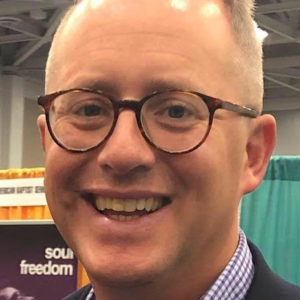
Brian Henderson
Likewise, Brian Henderson, pastor of First Baptist Church of Denver, had worked ahead because of a busy weekend schedule and had his sermon completed on Thursday. The Friday morning announcement from the high court sent him into rewrite mode as well.
While concerned about the direct effects of the abortion ruling, Henderson also acknowledged many in his inclusive congregation fear what may come next. He referenced Justice Clarence Thomas’ direct call for the court to revisit other cases he believes unconstitutionally found rights to contraception, same-sex relations and same-sex marriage.
“The Supreme Court’s ruling will now go beyond just reproductive rights.”
“The Supreme Court’s ruling will now go beyond just reproductive rights,” Henderson said. “I know there are some within our own church family that now live in fear — in fear that their life, that their family, that their lover or loved ones may not be able to live as freely as we’ve come to experience. Is it OK to be gay? Is it OK to stay gay? What about my marriage? What about my gender reassignment or reaffirming surgery? What about my grandson or granddaughter? She was just beginning the process of coming out to family and friends. Will she now be tempted to go back into the closet? My nephew is transitioning and expressing himself now more as herself. Will living authentically now be too risky for her? And what about my neighbor’s niece? For reasons that only she can express she does not want to bear a child. Will she need to move to another state? Will people really report her to the police? These are overwhelming and difficult days for sure.”
The bottom line, he warned, is that “a storm front of injustice appears to be blowing through our country.”
Part of a bigger picture
Some pastors explained to their congregations the decades-long sequence of events that led to Friday’s court ruling.

Justin Cox
Justin Cox, senior pastor at United Church of Lincoln, Vt., traced the history of modern fundamentalism in America, tying together Jerry Falwell’s Moral Majority, the successful effort by Paige Patterson and Paul Pressler to control the Southern Baptist Convention, and the election of Ronald Reagan as U.S. president.
“Beginning with fundamentalism, and moving toward the morally superior majority/Christian Right, and now Christian nationalism — is there a surprise that human rights are being ‘divinely inspired’ to be stripped and taken away? Is there a surprise that separation of church and state seems a concept forgotten by the powers that be that dictate laws for this country?
“The Supreme Court’s decision is one rooted in pandering to those who champion the cause of pro-birth but do little in the work of being pro-life.”
“The ruling of the Supreme Court just a few days ago appears to testify to this fact. A law overturned that will eliminate a woman’s right to do what she will with her own body is more than a grievance. The Supreme Court’s decision is one rooted in pandering to those who champion the cause of pro-birth but do little in the work of being pro-life.
“The overturning of Roe v. Wade is an injustice handed down by those who will never feel its weight directly, enforced on those who will suffer most because of it. Spurred on by moral superiority infused with biblical literalism/fundamentalism, packaged and distributed by unjust judges,” he said.
At Calvary Baptist Church in Waco, Texas, Pastor Hannah Coe also linked the Friday court ruling to a bigger picture with particular implications in Texas.
“Our state is in a time of moral and spiritual crisis in which the lives of many people are increasingly vulnerable,” she said. “Over the last year in Texas, much has been said and done in the political, legislative and unfortunately religious arenas which is intentionally designed to create ambiguity about what is lawful, what is faithful and to provoke an atmosphere of intimidation, fear and uncertainty.”
While there are “many issues and many stories I could name today, affecting many demographics in our state, especially our children,” Coe noted that “the fact that I don’t have time to name them all is something that deeply concerns me. “

Hannah Coe
She focused on three “life-threatening consequences of political and religious action” including the denial of voting rights, the targeting of LGBTQ teenagers, and the denial of basic rights and protections for women.
On the issue of reproductive health, she noted there are 6.1 million women of reproductive age in Texas.
“Scientists tell us that one in 50 women who get pregnant in our state will have an ectopic pregnancy, that eight in 100 women will experience complications in pregnancy, that 12 out of 100 women of childbearing age in Texas receive medical care for infertility each year. All women who fall into these categories of experience now potentially face barriers to vital health care.”
Further, “about one in four of the women of childbearing age in Texas (25%) do not have health insurance, the highest uninsured rate in the nation.”
And “a significant number of women experience domestic violence at some point in their lifetimes — about 25%. Women who are living in abusive situations, situations many of us could never fathom, now have fewer choices about their bodies, their children, their futures.”
She concluded: “As Baptists many of us have a high esteem for the values of freedom of conscience and freedom of religion. We need to understand that these freedoms are not valued by some highly influential political and religious influences in America, though they may pretend otherwise.”
Controlling the courts
A related common theme was calling out the long-term agenda of conservative evangelicals to manipulate American life through the courts.
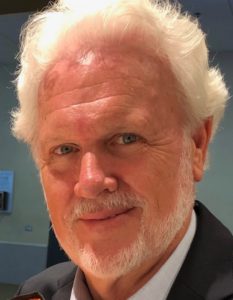
Dwight Moody
Preaching at Providence Baptist Church in Hendersonville, N.C., Dwight A. Moody explicitly addressed this: “For decades, one group of vocal and persistent voices has sounded out in the name of God. That group — some Catholics and some evangelicals — this week gained the microphone and announced to the world what they think is the word of the Lord.
“But I am here today to give voice to the rest of God’s people. I am here with Jeremiah to push back, to beg to differ, to speak a word that stirs up opposition. I am here to say: There is another way to love God, live in the Spirit and follow Jesus.”
The truth is that “not everybody looks at the gospel the same way, from the same place, asking the same questions,” he added. “Which is why, from the very beginning, we have had many options, many voices, many leaders claiming to march at the head of the Jesus parade. We struggle with that now, in the United States: Who speaks for God?
Regarding the latest abortion decision: “Millions of pew-sitting Christians in churches of all types have worked to this end, and they are celebrating today. They are celebrating not because America has changed its mind or practice, but because they finally secured six of their people on the Supreme Court.”
“They are celebrating not because America has changed its mind or practice, but because they finally secured six of their people on the Supreme Court.”
By serving the interests of conservative evangelicals and Catholics, the Supreme Court “demonstrated what minority rule looks like,” Moody declared. “The majority of Americans favor the right to choose. The majority of Americans favor stricter gun laws. The majority of Americans support the separation of church and state. But this week, six justices announced the end of privacy, the expansion of gun rights and serious damage to the wall of separation.
“But the rest of us have a voice as well. Fifty years of preaching, praying and protesting has not convinced the American people that a ban on abortion is a gospel imperative. Today, from pulpits, pews and prayer circles all over the country, we send our gospel greeting to the nation. We declare that religious ideology should not dominate public policy. We assert that tax dollars should not support the teaching in religious schools. We contend that surrendering guns rather than brandishing guns is inspired by the life and teaching of Jesus.”
An interfaith perspective
Courtney Pace, preaching at Shady Grove Presbyterian Church in Memphis, Tenn., took as her sermon text one of the biblical passages most quoted by anti-abortion Christians, Psalm 139. That text says in part: “For it was you who formed my inward parts; you knit me together in my mother’s womb. I praise you, for I am fearfully and wonderfully made. Wonderful are your works; that I know very well. My frame was not hidden from you, when I was being made in secret, intricately woven in the depths of the earth. Your eyes beheld my unformed substance. In your book were written all the days that were formed for me, when none of them as yet existed.”
 She explained: “This psalm is not an apology for life beginning at conception. That’s a gross misreading of the text. It’s about relationship with God, how God has made us in God’s image, how we share in God’s work in the world, because God has equipped us with understanding.”
She explained: “This psalm is not an apology for life beginning at conception. That’s a gross misreading of the text. It’s about relationship with God, how God has made us in God’s image, how we share in God’s work in the world, because God has equipped us with understanding.”
The historical reality is that people of faith have had various understandings of when life begins, she said. For Judaism and Islam, life begins at birth, and not during pregnancy. Christianity is a spectrum of beliefs ranging from conception to heartbeat to viability to birth. Not to mention Buddhism and Hinduism and others. And there are people who do not practice religion who have various beliefs about abortion as well. All of these beliefs are protected by the First Amendment, which separates church and state.
“So you can believe what you believe, and the government will protect your right to believe that way. But it will do that for everyone else, too. So again I say, if you believe abortion is wrong, no one can compel you to have one or financially support one. You don’t ever have to like them. But you cannot prevent others from accessing abortions because you personally believe they are wrong.”
She called on the congregation to put themselves in another’s vantage point: “I am not asking you to suddenly be comfortable with abortion if you aren’t, but I am asking you to think beyond your perspective to why others might choose it for themselves.”
A pastoral care perspective
Other pastors drew upon their years of counseling people who come to them at the most desperate times of life.
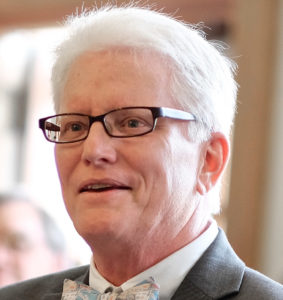
Don Flowers
Retired South Carolina pastor Don flowers was so moved by the events of the past week that, even though he’s not regularly preaching in a church, he wrote and posted a sermon online.
“This week, for the first time in our nation’s history, the Supreme Court took away freedoms that had stood for nearly 50 years.”
While calling himself “perhaps the last person that needs to be speaking on this topic” as a white male, he explained he and other pastors have a unique perspective because of the parishioners they’ve counseled through the years.
“As a pastor, I have heard the knock on the door late on a Friday night of a tear-soaked teenager who fears she is pregnant.”
“As a pastor, I have heard the knock on the door late on a Friday night of a tear-soaked teenager who fears she is pregnant. I have sat with a family who is struggling with what to do after learning that the 26-week baby they had hoped for has serious genetic issues that will not allow him to live long, and the life he had would be filled with pain. I have heard the stories of a teenager who was raped by a family member at such a young age she didn’t even know they were pregnant until she gave birth on the toilet.
“It was incidents such as these that led me to work to prevent teen pregnancy with the South Carolina Campaign to Prevent Teen Pregnancy, now Fact Forward. The efforts of so many over 25 years has led to a 70% reduction in teen pregnancies and according to the Guttmacher Institute, a 17% reduction in abortions in the past four years. That is just in South Carolina.
“So many have worked tirelessly to make sure abortions are safe, legal and rare. At times that has been misunderstood. More than a few times I have been accused of being pro-abortion. Pro-abortion! Is that even a thing? Do you know anyone who is going into pre-natal clinics and trying to entice mothers to have an abortion? Forget about the crazy internet stories that show up right there beside Bigfoot sightings. I have never met anyone who is pro-abortion.”
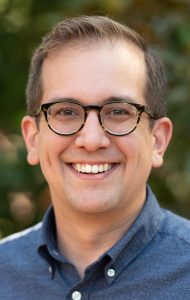
Scott Gilliland
At Arapaho United Methodist Church in Richardson, Texas, pastor Scott Gilliland offered a statement prior to his morning sermon, specifically addressing the high court ruling.
“The Bible gets thrown around a lot in this conversation, and it needs to be said clearly in churches that the Bible is unclear on the subject of personhood. Like so many contemporary social debates, it may seem simple to quote one or two or more verses that on the surface appear to support one stance or the other, but the reality is that Scripture does not equip us with an answer sheet for this stuff. In Genesis, it appears that personhood is gifted with first breath. In the Psalms, the poet describes God’s work within the womb. It’s not a settled subject in Scripture, and we must be honest about that.”
“The Bible gets thrown around a lot in this conversation, and it needs to be said clearly in churches that the Bible is unclear on the subject of personhood.”
And as a pastor, “my life of ministry has put me into contact … with people who will absolutely be harmed as a result of the laws that will trigger within a month. Regardless of your perspective on when personhood begins, as Methodists, our first rule is do no harm, and the harm that is coming should grieve us all. It’s why, as a denomination committed to uplifting and honoring the autonomy and equality of women, our official stance as the UMC is supportive of access to legal abortions, because we know the harm that exists when that access is taken away.”
And then, “as a father, I’m honestly just scared. I don’t know what this will mean for my daughter as she grows, I’m sad to say I really don’t. I’m not sure any of us can fully comprehend the ramifications of what this can and will mean. I do know that she now has less bodily autonomy than her grandmother did as a teenager. And I simply don’t know what that fully entails, and what I do know makes me worried as her dad.”
Keeping the peace in purple congregations
For now, many pastors are left trying to hold together congregations that are as diverse politically as the nation, to walk a fine line of preaching the Bible while not being “political.”
One of those is Terrell Carter, pastor of Webster Groves Baptist Church in St. Louis, Mo.
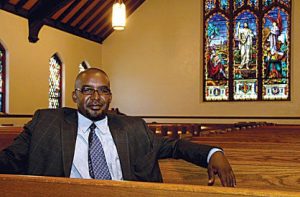
Terrell Carter
“I must clarify that this sermon is not about politics or abortion, so please do not hear this sermon through that type of prism or lens,” he said today. “In this sermon, I am neither for or against the decision handed down by the Supreme Court. There are God-fearing Bible-believing Christians on both sides of the discussion who have strong arguments in support of and in opposition to the court’s decision, and each group of those people can back their arguments up with strong theological and sociological information and arguments.
“The point of today’s sermon will not be to address the courts, abortion rights or partisan politics. The point of today’s sermon will be to think about how we interact with people whom we may disagree with or who walk a different path than us and understand the options that are available to us for engaging with them when we realize that we do not view life the same way. Do we have to treat them like our enemies or is there a different option?”
His message emphasized that being a disciple of Jesus “does not mean that we have to be enemies with anyone who does not follow Jesus or walk the same path we do when we choose to follow Jesus. We do not have to be enemies with anyone who disagrees with us about a political, theological, social or spiritual idea, even when those disagreements originate from the fact that we may be genuinely seeking to live out our faith in God as Creator and Jesus as Savior and someone else may not have the same worldview.
“Instead, like Jesus, we can seek to exhibit grace and mercy, even to those who are on the opposite side of the street from us on any given issue.”
Related articles:
Why I’m a pro-choice Christian and believe you should be too | Opinion by Laura Ellis
The Supreme Court’s politicized decision on abortion will do nothing to help churches thrive | Opinion by Mark Wingfield
American support for abortion rights at highest level since 1995, Gallup says

